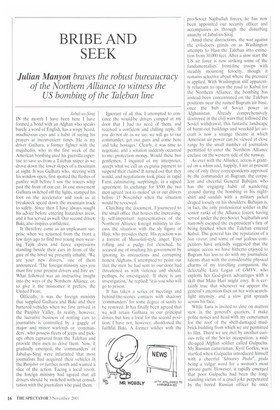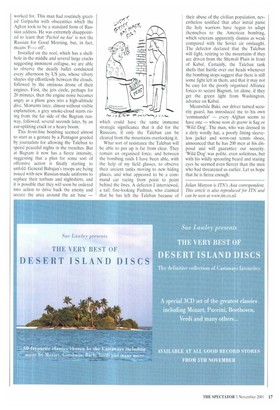BRIBE AND SEEK
Julian Manyon braves the robust bureaucracy of the Northern Alliance to witness the US bombing of the Taleban line
Jabal-us-Siraj IN the month I have been here I have formed a bond with an Afghan who speaks barely a word of English, has a wispy beard, mischievous eyes and a habit of saying his prayers at inconvenient times. He is my driver Gulhara, a former fighter with the mujahedin, who in the first week of the American bombing used his guerrilla expertise to save us from a Taleban sniper as we drove down the lower slopes of a mountain at night. It was Gulhara who, steering with his window open, first spotted the flashes of gunfire well before I saw the tracers whip past the front of our car. In one movement Gulhara switched off the lights, stamped his foot on the accelerator and took us at breakneck speed down the mountain track to safety. Since then I have always sought his advice before entering hazardous areas, and it has served us well. Our second driver, Saki, also inspires confidence.
It therefore came as an unpleasant surprise when we returned from the front a few days ago to find two young men wearing Tajik dress and fierce expressions standing beside their cars in front of the gate of the hovel we presently inhabit. 'We are your new drivers, one of them announced. 'The foreign ministry says you must fire your present drivers and hire us.' What followed was an instructive insight into the ways of the Northern Alliance, or, to give it the misnomer it prefers, the United Front.
Officially, it was the foreign ministry that supplied Gulhara and Baki and their battered vehicles when we first arrived in the Panjshir Valley. In reality, however, the lucrative business of renting cars to journalists is controlled by a gaggle of major and minor warlords or 'commanders', who possess fleets of jeeps and pickups often captured from the Taleban and provide their men to drive them. Now, it gradually emerged, the 'commanders' of Jabal-us-Siraj were infuriated that most journalists had acquired their vehicles in the Panjshir or further north and wanted a slice of the action. Facing a local revolt, the foreign ministry had agreed that all drivers should be switched without consultation with the journalists who paid them.
Ignorant of all this, I attempted to convince the would-be drivers camped at my door that I had no need of them, and received a confident and chilling reply, 'If you do not do as we say, we will go to our commander, get our guns and come here and take hostages.' Clearly, it was time to negotiate, and a solution suddenly occurred to me: protection money. Would these two gentlemen, I inquired of my interpreter, accept what we call an ex-gratia payment to suspend their claims? It turned out that they would, and negotiations took place in rapid Farsi, culminating, surprisingly, in a signed agreement. In exchange for S500 the two men agreed 'not to molest' us or our drivers before 15 November when the situation would be reviewed.
Clutching the document, I journeyed to the small office that houses the increasingly self-important representatives of the Northern Alliance foreign ministry to discuss the situation with the sly figure of Haji, who presides there. His reaction was a torrent of Mussolini-style anger. Eyes rolling and a pudgy fist clenched, he accused me of insulting his government by ignoring its instructions and corrupting honest Afghans. 1 attempted to point out that the men he had sent to our door had threatened us with violence and should, perhaps, be investigated. 'If there is any investigation,' he replied, it is you who will go to prison.'
It has taken a series of meetings and behind-the-scenes contacts with shadowy 'commanders' for some degree of sanity to be restored, It has finally been agreed that we will retain Gulhara as our principal driver, but hire a local for the second position. I have not, however, abandoned the faithful Baki. A former soldier with the
pro-Soviet Najibullah forces, he has now been appointed our security officer and accompanies us through the disturbing anarchy of Jabal-us-Siraj.
Amid these distractions, the war against the evil-doers grinds on as Washington attempts to blast the Taleban into extinction from 30,000 feet. After a slow start the US air force is now striking some of the fundamentalists' front-line troops with steadily mounting ferocity, though it remains selective about where the pressure is applied. With Washington still apparently reluctant to open the road to Kabul for the Northern Alliance, the bombing has instead been concentrated on the Taleban positions near the ruined Bagram air base, once the hub of Soviet power in Afghanistan. Already comprehensively destroyed in the civil wars that followed the Soviet withdrawal, this fantastic landscape of burnt-out buildings and wrecked jet aircraft is now a strange theatre in which American air power can be viewed at close range by the small number of journalists permitted to enter the Northern Alliance enclave on the western side of the runway.
As ever with the Alliance, access is granted on a whim and, happily, I am at present one of only three correspondents approved by the commander at Bagram, the corpulent and cheerful General Babajan, who has the engaging habit of wandering around during the bombing in his nightshirt and sandals with a military jacket draped loosely on his shoulders. Babajan is, in fact, the only professional soldier in the senior ranks of the Alliance forces, having served under the pro-Soviet Najibullah and narrowly escaped the ex-president's fate of being lynched when the Taleban entered Kabul. The general has the reputation of a bon viveur, and some of our jealous competitors have unkindly suggested that the unique access we have hitherto enjoyed to Bagram has less to do with my journalistic talents than with the considerable physical charms of my travelling companion, the delectable Lara Logan of GMTV, who exploits her God-given advantages with a skill that Mata Hari might envy. It is certainly true that whenever we appear the general's attention fixes on her with searchlight intensity, and a slow grin spreads across his face.
While Lara is invited to dine on mutton stew in the general's quarters, I make polite noises and head with my cameraman for the roof of the shell-damaged mudbrick building from which we are permitted to film. There we are met by another curious relic of the Soviet occupation, a middle-aged Afghan soldier called Gulpacha. My Russian cameraman, Kyril Gorlov, was startled when Gulpacha introduced himself with a cheerful `Sdrastwy Pisde, pisda being a vulgar word for a woman's most private parts. However, it rapidly emerged that poor Gulpacha had been the longstanding victim of a cruel joke perpetrated by the bored Russian officer he once worked for. This man had routinely greeted Gulpacha with obscenities which the Aghan took to be a standard form of Russian address. He was extremely disappointed to learn that Pachol na hut' is not the Russian for Good Morning, but, in fact, means 'F— off.
Installed on the roof, which has a shellhole in the middle and several large cracks suggesting imminent collapse, we are able to observe the deadly ballet conducted every afternoon by US jets, whose silvery shapes slip effortlessly between the clouds, followed by the ominous drone of their engines. First, the jets circle, perhaps for 20 minutes, then the engine noise becomes angry as a plane goes into a high-altitude dive. Moments later, almost without visible explanation, a grey smoke-cloud starts rising from the far side of the Bagram runway, followed, several seconds later, by an ear-splitting crack or a heavy boom.
This front-line bombing seemed almost to start as a gesture by a Pentagon goaded by journalists for allowing the Taleban to spend peaceful nights in the trenches. But at Bagram it now has a fierce intensity, suggesting that a plan for some sort of offensive action is finally starting to unfold. General Babaj an's troops are being issued with new Russian-made uniforms to replace their turbans and nightshirts, and it is possible that they will soon be ordered into action to drive back the enemy and secure the area around the air base — which could have the same immense strategic significance that it did for the Russians, if only the Taleban can be cleared from the mountains overlooking it.
What sort of resistance the Taleban will be able to put up is far from clear. They remain an organised force, and between the bombing raids I have been able, with the help of my field glasses, to observe their ancient tanks moving to new hiding places, and what appeared to be a command car racing from point to point behind the lines. A defector I interviewed, a tall. fine-looking Pashtun, who claimed that he has left the Taleban because of their abuse of the civilian population, nevertheless testified that after initial panic the holy warriors have begun to adapt themselves to the American bombing, which veterans apparently dismiss as weak compared with the Soviet air onslaught. The defector declared that the Taleban will fight, retiring to the mountains if they are driven from the Shemali Plain in front of Kabul. Certainly, the Taleban tank shells that hurtle over our heads whenever the bombing stops suggest that there is still some fight left in them, and that it may not be easy for the poorly organised Alliance forces to secure Bagram, let alone, if they get the green light from Washington, advance on Kabul.
Meanwhile Baki, our driver turned security guard, has introduced me to his own 'commander' — every Afghan seems to have one — whose nom de guerre is Sag or 'Wild Dog'. The man, who was dressed in a dirty woolly hat, a poorly fitting sleeveless jacket and worn-out tennis shoes, announced that he has 200 men at his disposal and will guarantee our security. 'Wild Dog' was polite, even solicitous, but with his wildly sprouting beard and staring eyes he seemed even fiercer than the men who had threatened us earlier. Let us hope that he is fierce enough.
Julian Manyon is ITN's Asia correspondent. This article is also reproduced for ITN and can be seen at www.itn.co.uk



















































































 Previous page
Previous page